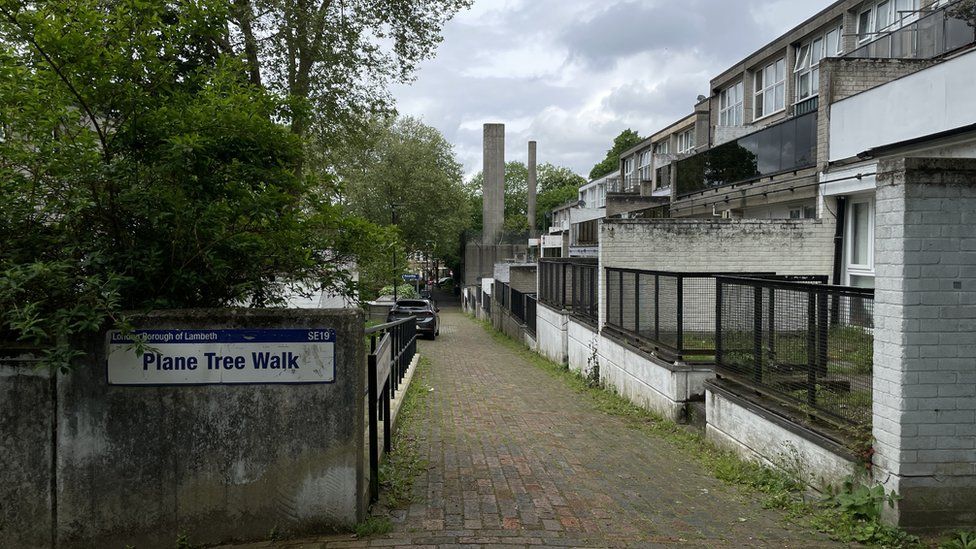Lambeth: Tenants forced to move out as council plans regeneration
- Published
- comments

Residents are being forced to leave Central Hill Estate in Norwood
More than 100 people on five housing estates in south London have been told they must look for somewhere else to live.
The private tenants had moved onto estates already earmarked for regeneration and potential demolition by Lambeth Council.
Tenants have accused the council of failing to be transparent, and said they feel "abused and fooled".
Lambeth Council said it would "provide vital housing for homeless families".
Mylene Lejuste with her son Samuel and husband Kouakou N'Gouandi
Mylene Lejuste and her husband signed a two-year lease in January 2022 and last November agreed to a renewal.
Within months, they were told their landlord "will now need possession of the property".
Their son, aged six, attends a local school and they said they felt part of the local community.
Ms Lejuste said: "When we viewed the property and they asked us how long we wanted to rent the place for, we said three years plus.
"Since day one we have told them this is our home. We are looking for a long term house. I felt abused and fooled. They knew from day one. I feel they haven't been transparent."
Many homes now lie empty
It is a similar story in other parts of the borough.
As well as Central Hill Estate in Norwood, there are 144 people set to leave Fenwick Estate in Clapham, Cressingham Gardens in Brockwell Park, Westbury Estate in Battersea and South Lambeth Estate in Oval.
Demolition plans
Lambeth Council, which says it has more than 43,000 people on its housing waiting list, announced regeneration plans in 2014.
In anticipation of demolition in 2017, it started moving social tenants off and buying back leaseholder properties.
People in temporary accommodation were able to move into some of the social rented homes.
Some of the former leaseholder properties were reoccupied by private tenants after the council set up an arms length management company called Homes For Lambeth (HfL).
The homes were advertised and let out by local estate agents. However, at the start of this year, the tenants were told the landlord - Lambeth Council - wanted the homes back.
Many of the tenants were unaware their landlord was Lambeth Council. On their contracts, the abbreviation HfL is used.
Pete Elliott, a former Green Party local councillor who lived on the Central Hill Estate for seven years, said private tenants had been treated appallingly.
Pete Elliott says there are unaddressed needs
He said: "There is no reason to move the private tenants off - they are paying a lot of money in rent.
"There are empty homes on the estate to move the people in to from temporary accommodation.
"We've got dozens of empty homes across the five estates they want to regenerate.
"What I want is for people to stay in their homes, let the kids stay at the schools. There are so many needs that have not been addressed."
A Lambeth Council spokesperson said: "The council is seeking to use all the properties it can to support those families most affected by the housing crisis.
"The properties in question are former right-to-buy homes that the council has bought back, and we are planning to use them to provide vital housing for homeless families in our borough.
"These properties were let to private tenants on a fixed-term basis, as Assured Shorthold Tenancies, and this was only ever intended to be a short-term measure.
"The tenants have been advised that when their current fixed-term tenancies come to an end they will not be renewed.
"The agencies managing the tenancies on behalf of Homes for Lambeth have contacted tenants to let them know that their tenancy will not be renewed and, where suitable, to offer support to help them find alternative accommodation."
Listen to the best of BBC Radio London on Sounds and follow BBC London on Facebook, external, X, external and Instagram, external. Send your story ideas to hello.bbclondon@bbc.co.uk, external
- Published11 March
- Published26 October 2023